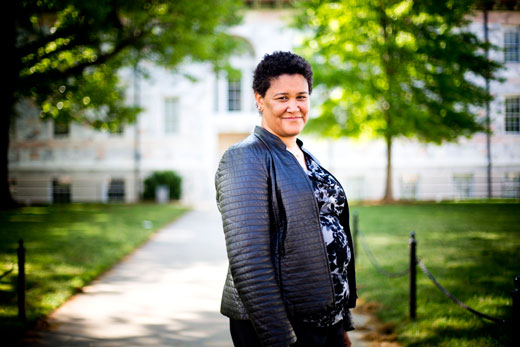As an associate professor of history and African American studies, Leslie Harris has earned praise both for her groundbreaking research into often overlooked aspects of the history of African American slavery and her generous classroom mentorship.
Yet, it is her ability to encourage difficult dialogues — to help people find their voices around issues of diversity and difference — that literally set the University talking.
In 2005, Harris became co-founder and director of Emory's Transforming Community Project (TCP), a five-year program designed to engage all sectors of the University in a process of discovery and dialogue about Emory's racial history — a program that still resonates throughout much of the campus community.
As this year's recipient of the 2013 University Scholar/Teacher award, Harris is recognized for the breadth of her service in scholarship, classroom and community. The award is chosen by Emory faculty on behalf of the United Methodist Church Board of Higher Education and Ministry.
A Winship Distinguished Research Professor in the Humanities who came to Emory in 1995, Harris reflects upon a career punctuated by unexpected turns. Yet somehow, her academic path seems to have unfolded naturally, as if it were simply meant to be.
The daughter of middle school and high school teachers, Harris says she grew up knowing that she did not want to be a teacher. "They worked all the time!" she laughs. "I went to college thinking that I would become a lawyer."
But it was while studying American history and literature at Columbia University that she was challenged to consider a life in academia. Devouring history books only fed her interest in research.
Harris didn't start out focusing on slavery. Early interests included 20th century African American history, women and gender. During graduate studies at Stanford University, the influence of both powerful books and inspiring mentors left her deeply curious about the history of African Americans in New York City.
Her first book, "In the Shadow of Slavery," began "as a study of emancipation in New York City between 1785 and 1827 and the lives of free blacks down to the Civil War," she recalls.
Trying to describe her work, "I kept getting confused looks," she says. "Finally, I realized that people didn't really know that there had been slavery in New York City, and I needed to tell that story."
Slavery has persisted as a research interest, growing to include slavery and masculinity, and sexuality and slavery. In 2011, Harris served as principal organizer for "Slavery and the University: Histories and Legacies," a groundbreaking national conference held at Emory.
Harris knows that some might be surprised at where her path has led — a modern historian teaching about slavery at a historic Southern university.
But it's been a good place to make a difference. "I wanted my work to be not just in the classroom, but to have a public impact," she explains.
"The issues of racial diversity are still with us," she adds. "Because of our history, we at Emory should really be, at the heart, leaders in examining those difficult questions of diversity and embracing it as an intellectual opportunity."

